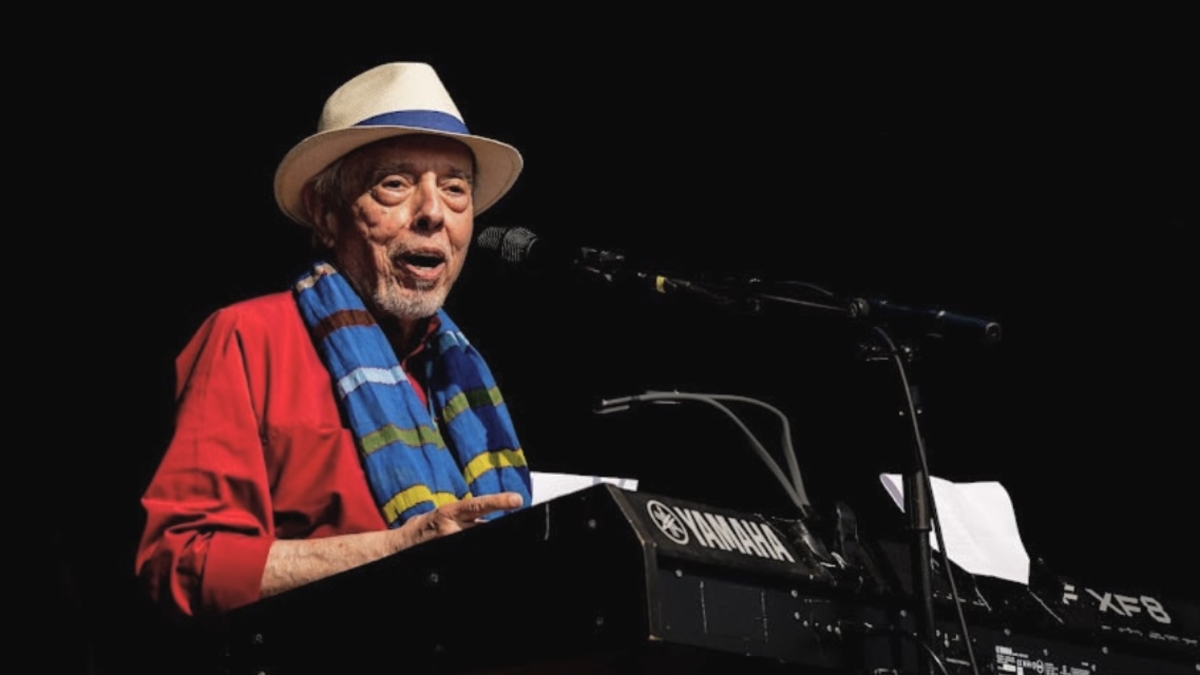Sergio Mendes, the Brazilian pianist, composer, and arranger who introduced bossa nova to a global audience in the 1960s with his ensemble Brasil ’66 and remained a major figure in popular music for over six decades, passed away on Thursday in Los Angeles. He was 83.
His family announced that he died in a hospital due to complications from long Covid.
Mendes released more than 30 albums, won three Grammys, and was nominated for an Academy Award in 2012 for Best Original Song (as co-writer of “Real in Rio,” from the animated film Rio).
His American breakthrough came in 1966 with Brasil ’66 and the single “Mas Que Nada,” written by Brazilian singer-songwriter Jorge Ben.
Mendes’ sound was rhythmically intricate yet easy on the ears, expanding bossa nova’s original guitar-based style with rich keyboard arrangements and soothing vocal harmonies, often including Mendes himself alongside two female vocalists.
Signed by Herb Alpert, Brasil ’66 achieved a gold record with their first release on Alpert’s A&M Records label.
The group’s soft, sensual rhythms became emblematic of adult contemporary cool in the 1960s, standing in stark contrast to the youth-driven rock ’n’ roll culture then dominating the charts after the rise of the Beatles.
“It was completely different from anything else, and especially from rock ’n’ roll,” remarked Latin music scholar Leila Cobo in the 2020 HBO documentary Sergio Mendes in the Key of Joy. “But it shows how confident Sergio was in his sound. He didn’t try to mimic what others were doing.”
After his first visit to the United States in 1962 to perform at a bossa nova concert at Carnegie Hall with many of the genre’s pioneers, including his mentor Antonio Carlos Jobim, Mendes returned to Brazil. However, he fled the country in 1964 following a violent military coup, which led to his brief arrest.
Mendes then recorded and toured in the U.S. with Brasil ’65, but the group’s lukewarm reception led the other members to return to Brazil. Mendes, however, remained determined to find success in America.
His final gig with the group was in Chicago at a club called Mother Blues. In the HBO documentary, Mendes recounted how he entered the club that night and saw a young woman playing guitar and singing.
“Wow, what an incredible voice,” he recalled thinking. That singer was Lani Hall, and he invited her to become the lead vocalist for his new band. Hall, only 19 at the time, told Mendes, “You’ll have to ask my father.”
After receiving her father’s hesitant approval, Hall flew with Mendes to Los Angeles, where the two began working together. Mendes soon brought in another vocalist, Bibi Vogel, from Brazil.
“When I heard the two girls singing together,” Mendes said, “I thought, ‘This is it. I love this sound!’”
The newly-formed Brasil ’66 made its debut at a resort in the Bahamas but was asked to stop playing after patrons complained that their music wasn’t danceable.
Chastened but undeterred, Mendes brought the group back to Los Angeles. Soon after, they received an audition with Herb Alpert for his new record label, A&M. Alpert signed the band on the spot.
Their debut album, Herb Alpert Presents Sergio Mendes & Brasil ’66, became an instant success, going gold with hits like “Mas Que Nada,” “Going Out of My Head,” and “One-Note Samba.”
In 2011, the album was inducted into the Grammy Hall of Fame. “Their sound was outstanding,” Alpert recalled in the documentary, “a blend of Brazilian music, jazz, folk, African, and blues.
It had all those elements. And Lani Hall’s voice topped it off beautifully. I fell in love with their sound. It was incredibly unique.”
Sergio Santos Mendes was born on Feb. 11, 1941, in Niterói, Brazil, to a physician. At the age of three, he was diagnosed with osteomyelitis, a bone inflammation that kept him in a cast for three years.
His father eventually obtained penicillin, which had just been introduced, and young Sergio was one of the first in Brazil to take the drug, leading to his recovery.

Sergio Mendes (Photo: Instagram)
Unable to engage in physical activities, Mendes was given a piano and began music lessons with his mother, eventually studying at the Conservatory of Music in Niterói. His love for jazz was ignited in 1956 when he heard the Dave Brubeck Quartet’s Take Five.
By age 17, Mendes was playing in local dance bands and jazz venues. He later performed in Rio’s Copacabana entertainment district, where he became a rising star in the bossa nova scene.
His Bossa Rio Sextet became popular throughout Brazil, and in 1962, he recorded Você Ainda Não Iuviu Nada! (“You Haven’t Heard Anything Yet!”), which fused bossa nova with jazz.
Later that year, Mendes performed at Carnegie Hall with Antonio Carlos Jobim. The following night, at Birdland, New York’s renowned jazz club, Mendes met saxophonist Cannonball Adderley, who invited him to stay in the U.S. and record an album.
The resulting Cannonball’s Bossa Nova (1963) brought Mendes to the attention of Atlantic Records executive Nesuhi Ertegun, who signed him and produced The Swinger From Rio, released in 1966.
Although Mendes’ contract with Atlantic caused complications when he signed with A&M, Ertegun allowed Mendes to retain rights to his instrumental albums.
Mendes went on to make over a dozen albums with Brasil ’66, nearly all of which went gold or platinum. Their version of the Beatles’ “The Fool on the Hill” (1968) became a hit, selling four million copies. Paul McCartney later thanked Mendes for his arrangement of the song.
Mendes gained further international recognition in 1968 when he performed Burt Bacharach and Hal David’s “The Look of Love” at the Academy Awards. That same year, Lani Hall left Brasil ’66 after falling in love with Herb Alpert, whom she married in 1973.
Mendes continued recording and performing for more than five decades. He toured with Frank Sinatra, performed at the White House, and scored a Top 10 hit in 1983 with “Never Gonna Let You Go.”
He also worked with Hall again in 1983, producing her vocals for the James Bond film Never Say Never Again.
Dismissed by some as a creator of “elevator music” in the 1990s, Mendes returned to his roots with the Grammy-winning Brasileiro in 1992.
In the 2000s, he rejuvenated his career by collaborating with contemporary artists like the Black Eyed Peas, John Legend, and Pharrell Williams.
Mendes received a Lifetime Achievement Grammy in 2005 and another Grammy in 2010 for Bom Tempo as Best Brazilian Contemporary Pop Album.
Mendes is survived by his wife of 50 years, Gracinha Leporace, who replaced Lani Hall in Brasil ’66, their two children, Tiago and Gustavo, three children from a previous marriage, Bernardo, Rodrigo, and Isabella, and seven grandchildren.
Despite the enduring appeal of the Brasil ’66 sound, Mendes was always forward-looking. “He doesn’t go backward,” Hall once said. “He moves forward.”
Reflecting on his music, Mendes once said, “The word is ‘joy.’ ‘Alegria.’ The next party. I’m ready.”
























